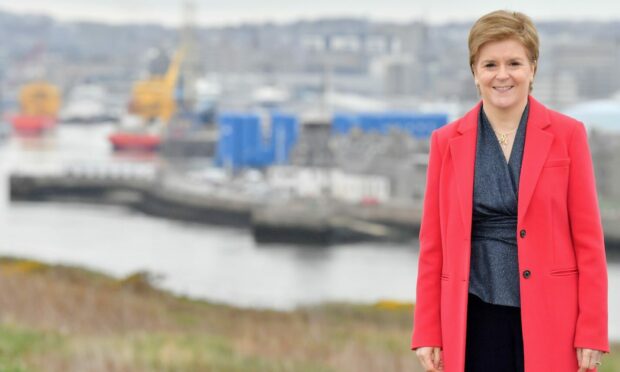Rosyth ferry links, renewable energy and land reform are part of the regionally-focused agenda for the SNP’s party conference in Aberdeen on Saturday.
Nicola Sturgeon will be with activists in Aberdeen over October 8-10 for the party’s first in-person conference since the Covid-19 pandemic.
As well as independence and other national talking points, many of the main topics affect Courier Country.
Rosyth to Zeebrugge ferry link
Plans to create a direct ferry link between Rosyth and Europe will fall under the spotlight at conference on Saturday.
A freight route is expected to run from the port in the Firth of Forth to Zeebrugge on the coast of Belgium.
It was previously the only direct ferry link between Scotland and Europe until freight services were scrapped in 2018.
A passenger service also operated until 2010.
The motion to conference welcomes the news of the proposed reopening of the route.
It blames “decades of inaction and underinvestment by Westminster” for a situation where there is no mainland ferry link between Scotland and continental Europe.
Calls will be made to consult with coastal communities, particularly those in the islands, and to establish an “ambitious maritime strategy”.
Community buses
Conference will explore the potential for setting up community bus services across the country in a bid to encourage the public to better use public transport.
One of the debates at P&J Live venue in Aberdeen will call for the Scottish Government to set up a working group with council chiefs to investigate how this can be achieved across local authorities.
The resolution has been endorsed by branches including Angus North & Mearns , proving its a hot topic for party members in the region.
Land reform
The SNP government is currently consulting on plans for a land reform bill – to be introduced in 2023.
The legislation plans to address long-standing concerns about the highly concentrated pattern of land ownership in rural areas of Scotland, such as Highland Perthshire.
Scotland’s land reform minister Màiri McAllan said the “radical” legislation to tackle so-called “green lairds” is needed to stop a new Highland Clearances.
But others have criticised the “vague” proposals as not going far enough.
The term “green lairds” describes companies and individuals buying up estates across Scotland to boost their environmental credentials.
SNP grassroots members from Tayside have put forward a motion on Saturday which proposes more radical proposals than the government have adopted so far.
Activists are pushing for the introduction of “legally-binding limits” on the total amount of land individuals or companies can own.
The resolution, which has been put forward by three SNP branches, including Dundee City West, also calls for an end to “secret land deals”.
Renewable energy
Delegates will also discuss the move away from fossil fuels, in a region known for being the oil and gas capital of Europe.
Calls will be made for greater investment in solar energy, including pushing for all publicly funded buildings to be surveyed on their suitability for rooftop solar panels.
The Scottish Government will also be asked to make changes in building control regulations for new construction or major developments.
The changes include:
- Solar PV panels on every available roof space.
- Pressurised water systems.
- Under floor heating and a ban on any future radiator installations.
- Triple glazing.
And…Scottish independence
It would not be an SNP conference without discussion of the constitutional question.
It is likely to be a major part of Ms Sturgeon’s closing address on Monday – around a year away from the proposed date of the next referendum.
Several motions are planned including agreeing proposals to combat the spread of disinformation.
Delegates will also be asked to agree a code of conduct and a communication strategy to “present a convincing case” in the build up to the next vote.


